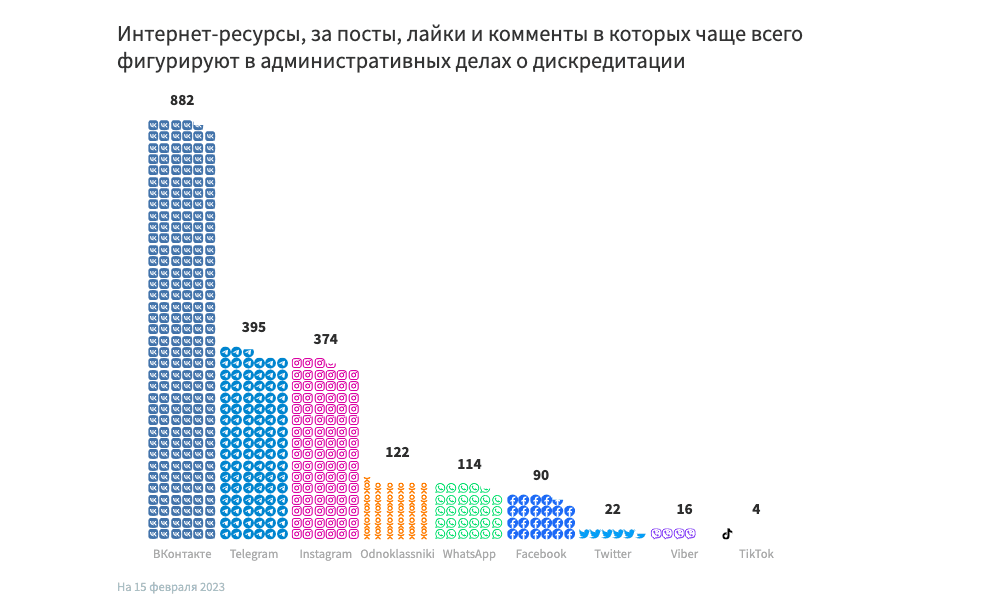Since the beginning of 2023, publications have been circulating that highlight problems with freedom of speech in the UK - in particular, the arrest of 3,300 people a year for publishing online. We checked whether these data are confirmed.
Received more than a million views in January 2023 video clip on TikTok, in which Russian-born British publicist and podcaster Konstantin Kissin claims that “last year in Russia, 400 people were arrested for posts on social networks, and in Britain - 3,300.” Hundreds of thousands and even millions the same video received views on YouTube, it also broke up by blog platforms, Twitter Telegram And relatively small number websites. The information voiced by Kissin became the basis for published in April, an article on Life.ru, thanks to which the plot received a new breath in Facebook, "Odnoklassniki", "VKontakte» Telegram. According to the TGStat service, in the Russian-language segment of Telegram, data voiced by Kissin regularly are used as argument in favor of the fact that in Russia the situation with freedom of speech is better than in the countries of Europe and North America.
The video being circulated on social networks is genuine, it is a fragment from interview, which Kissin gave to Jon Anderson, a former Australian deputy prime minister and now a popular podcaster and video blogger. It is in Anderson's accounts TikTok And YouTube this episode was published in January 2023. But the interview was recorded back in 2019; Accordingly, the comedian's statements should actually apply to 2018. But by all indications the data is even older. The only source in which data for Great Britain coincides with those voiced by Kissin is article under the headline “Police arrest nine people a day in fight against web trolls”, published by the British newspaper The Times back in 2017, and the data themselves refer to 2016.
The text of The Times article does indeed report more than 3,300 UK residents arrested in a year, but below it is clarified that we are not talking about arrest as a punishment, but about those detained and questioned in cases of violation of section 127 of the Communications Act (Communications Act, 2003). It provides for liability for letters, messages or articles containing obscene or offensive statements or threats, as well as false information posted on the Internet or distributed using other “public communication networks”. This article provides for punishment either in the form of a fine according to the accepted standard scale up to £5,000, or imprisonment for a term of up to six months, or a combination of these measures.
The author of the note in The Times clarifies that the data is incomplete - some British police departments did not respond to the editor’s request. 3395 people is a figure received from 29 territorial services (there are 45 of them in total). The journalist separately analyzes reports from police departments in the two largest regions: Greater London and the West Midlands. According to the publication, the police of the capital region in 2016 detained 867 people under the above-mentioned law, while it is noted that, despite a significant increase in the number of arrests, the number of cases received by the courts remains stable.
In 2022 London police published detailed statistics since 2008, and they generally confirm the data of The Times. The agency specifically notes that “the number of arrests is not equal to the number of detainees,” since the same person could be interrogated several times, and therefore official statistics are based on the number of so-called custody records - protocols about what happened to the detainee at the police station. The data shows that in 2016, 886 interrogations were carried out in police stations under section 127 of the Communications Act. But more telling is the number of cases that resulted in charges being brought - in the British capital there were a total of 275. Full statistics for individual regions are not available, but the maximum number of convictions under this article was in Scotland, where those found guilty of breaching section 127 in 2015-2016 recognized up to 900 people.
Russian statistics in this regard are also incomplete; there is no official count of cases opened specifically for statements on social networks, and there are more than enough articles suitable for this in the Criminal Code and the Code of Administrative Offenses (CAO) of the Russian Federation. It may not only be relatively close to the British article 282 The Criminal Code of the Russian Federation (incitement of hatred or enmity, as well as humiliation of human dignity), but also articles related to extremism and terrorism, as well as “insulting the feelings of believers.” The punishment, depending on the offense, can vary from a fine of 1000–2000 rubles. or arrest for 15 days - for example, for demonstration prohibited symbols, up to 500,000 rubles. fine for article about insulting the feelings of believers or even up to 12 years in prison under article 282.1 of the Criminal Code of the Russian Federation (organization of an extremist community; for example, a group of young people were accused of this crime under the so-called business “New Greatness”, where the basis of the accusation was correspondence in a closed chat).
The data cited by Kissin about “400 people arrested for posts” in Russia, like the British ones, do not apply to 2022. The figure of 411 people against whom criminal cases were opened in 2017 for publications and reposts on the Internet in Russia, voiced lawyers of the Agora group. The same assessment is in the report “Roskomsvoboda“- a year earlier, according to their data, cases were opened against 298 people. Human rights activists emphasize: these are the persecutions that came to their attention; there are no complete statistics on either criminal or administrative cases for posts on social networks.
In Russia, no one keeps detailed statistics on administrative fines and arrests specifically for statements on the Internet, but a general idea of the situation can be formed based on data Supreme Court of the Russian Federation. Among the articles of the Code of Administrative Offenses, under which cases are often opened specifically for publications on the Internet, are, for example, Article 20.3 (display of prohibited symbols) and Article 20.29 (public dissemination of extremist materials). In 2016, 2119 cases were opened under Article 20.3 (fines awarded in 1754 cases, arrests in 221), and 1925 cases under Article 20.29 (fines - 1631, arrests - 43).
In any case, it is hardly possible to correlate these figures (400 and 3300) following Kissin, also because Russia and Great Britain belong to different legal families. In the United Kingdom, unlike the countries of continental Europe, there is no criminal or administrative code in the usual sense, and Article 127 of the British Communications Act covers both some of the offenses that in Russia would be considered criminal offenses and those that would be considered administrative offences. Because of this, it is extremely difficult to generalize the already scattered data on punishments for various offenses.
Reports by human rights activists show that the number of administrative and criminal affairs for online publications in the Russian Federation in latest only a few years grew, and in 2022 due to changes in legislation opportunity getting a fine or imprisonment for speaking on the Internet has become even higher. In 2022, OVD-info recorded at least 139 criminal cases under this article alone 207.3 of the Criminal Code of the Russian Federation (deliberately false information about the Armed Forces). Also, according to the organization, at least 2,000 court decisions for 2022 under Article 20.3.3 of the Code of Administrative Offenses of the Russian Federation (discrediting the Armed Forces) mention social networks and instant messengers. The Network Freedoms Project in its report reports about 779 criminal cases over the past year and about 1889 cases of administrative pressure.

The mentioned article in The Times, a report by London police officers and available data from territorial police departments in the UK allow us to conclude that, at least in the British capital, the number of arrests for posts on social networks has not increased since 2016, and the number of cases brought to court has even decreased. The trend towards a decrease in the number of convictions is noticeable even in Scotland, which led in the mid-2010s in the number of cases and sentences under section 127 of the Communications Act - the number of convictions and sentences almost halved in 2018. With comparable fines in some cases, the term that can be received in Russia for expressing one’s opinion on the Internet can exceed the British one by 20 times, depending on the article of the Criminal Code of the Russian Federation. Yes, five years received Elista City Hall employee Altan Ochirov for conducting Telegram channel, by the age of eight he was in absentia sentenced retired police major Oleg Kashintsev for posts on Instagram and Telegram, eight years and six months in prison sentence appointed Ilya Yashin for the YouTube stream dedicated to events in Ukrainian Buche.
Thus, a video that circulated in 2023 claiming that many times more people were arrested for online speech in the UK in the previous year than in Russia was based on statistics from 2016. Moreover, these data are taken out of context and are generally not suitable for making fair comparisons due to differences in UK and Russian legislation and enforcement. In any case, the available information does not allow us to say that in the UK the chance of being detained or arrested for posts on social networks in both 2016 and 2022 was any higher than in Russia. At the same time, you can be “jailed for reposting” in the Russian Federation for a number of articles, and the term of imprisonment can be much longer than in the United Kingdom, where the corresponding article is not of a political nature.
Cover photo: Pixabay
- Is it true that legally Germany is still occupied by US troops?
- Is it true that a porn actor was arrested in the United States after he beat up a group of neo-Nazis?
If you find a spelling or grammatical error, please let us know by highlighting the error text and clicking Ctrl+Enter.






